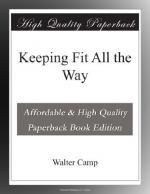Breakfast
Approximate
Calories
Orange or grapefruit.................... 100 Two eggs................................ 166 Two Vienna rolls........................ 258 Butter.................................. 119 Coffee with milk and sugar.............. 100 Total................................... 743
Luncheon Approximate
Calories
Twelve soda crackers.................... 300 One pint milk........................... 325 —– Total................................... 625
Dinner
Approximate
Calories
Soup (consomme)......................... 14 Roast beef.............................. 357 Potato.................................. 145 String beans or peas.................... 13 Bread................................... 100 Butter.................................. 119 Apple pie............................... 352 Glass of milk........................... 157 —— Total.................................. 1257
Many people have adopted a so-called vegetarian diet, believing that it is better for the health than eating meat. Undoubtedly food from the vegetable kingdom is a great benefit to the human system, but strict vegetarianism is not recommended by our medical men. Nature apparently intended us to be omnivorous, and, in addition, vegetarianism may run too close to the dangers of carbohydrate excess. As man progresses after middle life he can unquestionably diminish materially the amount of meat in his diet.
In recent years there has been a revival of the theory of prolonged mastication of a limited amount of food. This theory is sound in so far as it tends to overcome the bolting of food and over-eating, but there is a belief among our practitioners that there is little basis in science or experience for the extremes of this character.
HYGIENIC CURE-ALLS
Among recent fads is the so-called buttermilk or sour milk diet as advocated by Metchnikoff. The original theory was interesting and was, in part, that the bacteria derived from soured milk would drive out of the intestinal canal all the harmful germs. Quite possibly there may be something in the theory, especially if large quantities of milk are taken with the lactic acid bacilli, but the beneficial effect of this change of bacteria is not convincingly of great consequence.
FRESH AIR
It is now generally known that an abundant supply of moving, pure, fresh air is the proper and simple solution of the problem of the hygiene of the air.
Oxygen is the element of the air which sustains life. We inhale about seven pounds per day, two pounds of which are absorbed by the body. The air becomes dangerous, or infected, when the oxygen in the air is decreased to only 11 or 12 per cent., and when the oxygen reaches 7 per cent. death occurs from asphyxiation.




